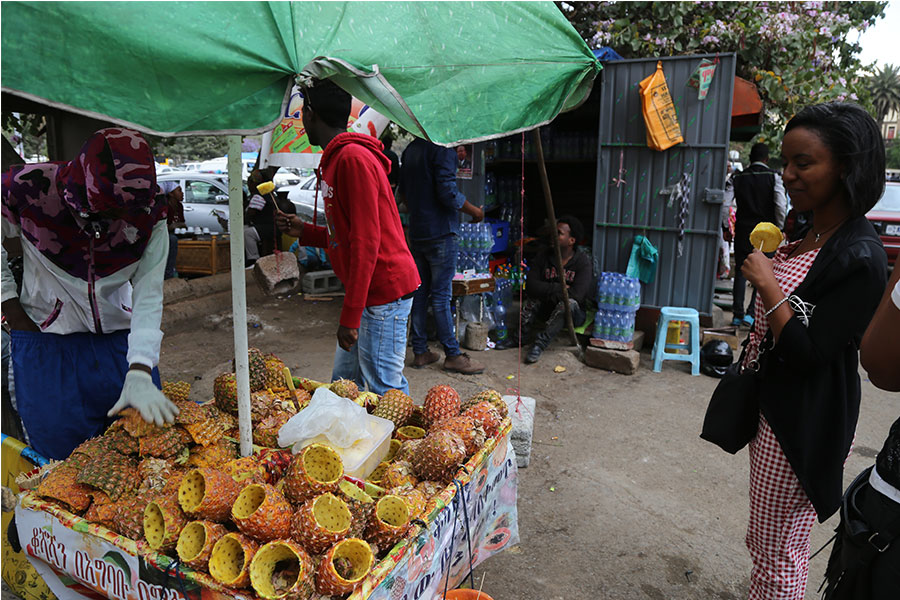
Fortune News | May 18,2019
Jan 26 , 2019
By Yayehyirad Abate
A new bill has been tabled to parliament that will introduce new regulations for tobacco use and sales. But a number of its proposals will be counterproductive to the tobacco industry and the economy if legislated, writes Yayehyirad Abate, corporate affairs and communications director at the National Tobacco Enterprise.
A bill was recently tabled in parliament on the amendment to the food and pharmaceutical law of Ethiopia. If legislated, it will put unwarranted impositions on tobacco products production and distribution in Ethiopia.
The government’s desire to enhance the regulatory regime for tobacco control is understandable. Indeed, minors should not smoke and should be prevented from obtaining and using tobacco products. It is also crucial that non-smokers not be affected by the actions of tobacco users.
Appropriate, evidence-based and proportionate regulations will be in line with the internationally accepted principles of the Organization for Economic Co-operation & Development.
Nonetheless, the draft legislation proposed by the Food, Medicine & Health Care Administration (FMHACA) is bound to fail given that the cost-benefit analysis is skewed. It goes beyond the minimum requirements of the WHO's Framework Convention on Tobacco Control (WHO-FCTC) and fails to take the realities of the country into account.
There are better ways to enhance tobacco control in Ethiopia. Using the existing space mandated for health messages for different health warnings, removing the right of retailers to sell to minors and targeted public information campaigns about the risks of smoking and respect for non-smokers are some of them.
The draft proclamation proposes more than doubling the size of the health warning to 70pc of the cigarette packet. The National Tobacco Enterprise’s (NTE) current packs feature a 30pc health warning in accordance with local law and WHO requirements. These warnings, in English and Amharic, provide clear information about the health risks associated with smoking. In contrast, contraband products do not comply with such requirements.
If the bill becomes law, and the health warning portion of the cigarette packets is more than doubled, legal tobacco producers such as NTE will comply. The black market would not, however.
Increasing the size of these health warnings would not change smoking behaviour and, accordingly, would not cause a reduction in tobacco consumption. It will only hinder NTE’s ongoing efforts to convince smokers to buy legal products instead of contraband.
If the change as proposed passes, it will only benefit the illicit business, as this initiative will drive smokers’ preference toward illegal brands. Considering that the current 30pc health warning sign already complies with WHO requirements, it is not only unnecessary but counterproductive.
The draft also proposes a tobacco display ban. Currently, products are displayed to consumers to provide them with a choice. Despite contraband products being illegal by definition and despite enforcement, many retailers are not shy to display contraband in plain sight, next to legal products. When a retailer is more risk-averse, contraband products are sold under the counter.
The proposal made is to prohibit the display of tobacco products. While legal tobacco producers are mandated to ensure cigarettes are sold in compliance with this measure, such a measure will not make a difference on contraband products as they are illegal already.
The consequence of this is that in the more cautious outlets, legal tobacco products would be sold under the counter at the same level as contraband. With more daring retailers, contraband products would continue to be displayed, but not legal ones.
Even if contraband had not been a major problem in Ethiopia, a tobacco display ban is arguably ineffective. All this measure will achieve is reducing the chances of smokers to choose legal products over contraband.
What is evident from the bill currently under consideration in parliament is that FMHACA’s main objective is to regulate for the sake of regulating despite their benefit to the illegal trade. If this draft is legislated by parliament, without sufficient positive impact on public health policy, the tobacco industry will be affected.
The almost three-quarters of a century old NTE, for instance, provides direct employment to over 1,200 Ethiopians and indirect employment to over 10,300 tobacco out-grower farmers. The out-grower farmers who have been working with the company for several decades are using their plots of land to grow tobacco on a rotation basis with other crops.
Seventy-one percent of NTE is owned by Japan Tobacco International, headquartered in Geneva, Switzerland, after acquiring shares from the government over a year ago for one billion dollars, the largest private sector investment by a Japanese company in Ethiopia to date. It is such an industry that is at stake.
The government is another loser. It misses out on revenue generated from the industry and gives the wrong signal to potential foreign investors. It will be noted when a company that paid about a billion dollars faces such restrictions that have never been initiated and implemented in the entire region in less than two years.
It goes against the economic agenda of the current administration in terms of encouraging FDI, growing business and increasing tax revenue and employment opportunities.
Instead of the proposed measures, the government should conduct an appropriate assessment of their potential impact on smoking consumption and prevalence and the unintended consequences. There also need to be non-regulatory alternatives, such as enforcement of existing regulations, public information and tailored education initiatives.
PUBLISHED ON
Jan 26,2019 [ VOL
19 , NO
978]


Fortune News | May 18,2019

Fortune News | Jun 20,2020

Commentaries | Mar 12,2022

Fortune News | Dec 12,2020

Radar | Mar 16,2019

Fortune News | Apr 26,2019

Fortune News | Nov 30,2019

Radar | Jun 29,2025

Radar | May 04,2019

Radar | Apr 15,2023

My Opinion | 132046 Views | Aug 14,2021

My Opinion | 128443 Views | Aug 21,2021

My Opinion | 126372 Views | Sep 10,2021

My Opinion | 123991 Views | Aug 07,2021





Dec 22 , 2024 . By TIZITA SHEWAFERAW
Charged with transforming colossal state-owned enterprises into modern and competitiv...

Aug 18 , 2024 . By AKSAH ITALO
Although predictable Yonas Zerihun's job in the ride-hailing service is not immune to...

Jul 28 , 2024 . By TIZITA SHEWAFERAW
Unhabitual, perhaps too many, Samuel Gebreyohannes, 38, used to occasionally enjoy a couple of beers at breakfast. However, he recently swit...

Jul 13 , 2024 . By AKSAH ITALO
Investors who rely on tractors, trucks, and field vehicles for commuting, transporting commodities, and f...

Jul 12 , 2025
Political leaders and their policy advisors often promise great leaps forward, yet th...

Jul 5 , 2025
Six years ago, Ethiopia was the darling of international liberal commentators. A year...

Jun 28 , 2025
Meseret Damtie, the assertive auditor general, has never been shy about naming names...

Jun 21 , 2025
A well-worn adage says, “Budget is not destiny, but it is direction.” Examining t...

Jul 13 , 2025 . By YITBAREK GETACHEW
The Addis Abeba City Revenue Bureau has introduced a new directive set to reshape how...

Jul 13 , 2025 . By BEZAWIT HULUAGER
Addis Abeba has approved a record 350 billion Br budget for the 2025/26 fiscal year,...

Jul 13 , 2025 . By RUTH BERHANU
The Addis Abeba Revenue Bureau has scrapped a value-added tax (VAT) on unprocessed ve...

Jul 13 , 2025 . By NAHOM AYELE
Federal lawmakers have finally brought closure to a protracted and contentious tax de...